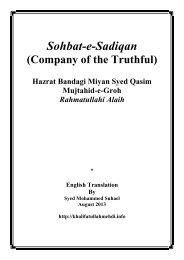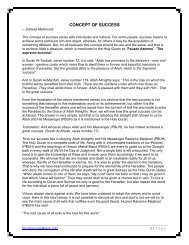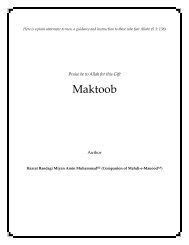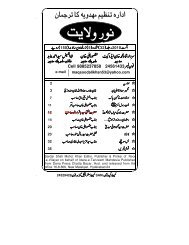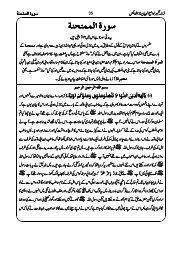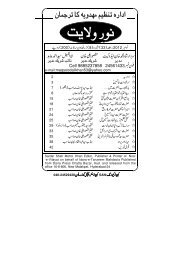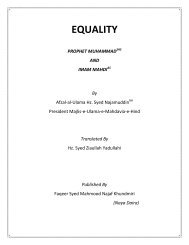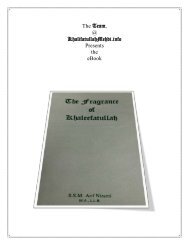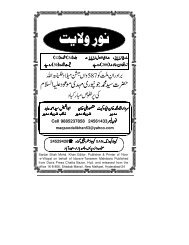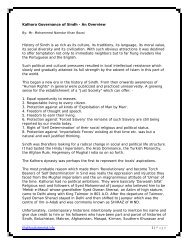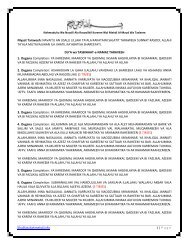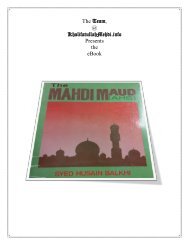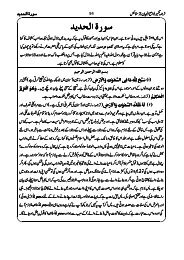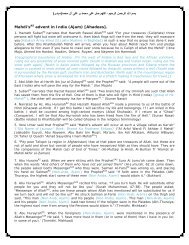TRUST IN ALLAH [Tawakkul] - Khalifatullah Mehdi
TRUST IN ALLAH [Tawakkul] - Khalifatullah Mehdi
TRUST IN ALLAH [Tawakkul] - Khalifatullah Mehdi
Create successful ePaper yourself
Turn your PDF publications into a flip-book with our unique Google optimized e-Paper software.
Excerpt from Tauzihat Asad-ul-Ulama Hzt Abu Sayeed RH<br />
eater] among the group of fuqara” came on his tongue in extreme care for his taqwa<br />
[piety]. A parable in Insaf Nama supports this contention.<br />
“Miyan Fareed RZ quotes Imam Mahdi AS as saying, ‘If a seeker of Allah is sitting in his<br />
room [hujra] and hears the footsteps of somebody and if the thought crosses his mind that<br />
somebody might have brought futuh [donations], it is not <strong>Tawakkul</strong> [Trust in Allah].” 17<br />
From this point of view, the deed of Hazrat Ilahdad Shair RZ was in perfect obedience to<br />
the teachings of Imam Mahdi AS .<br />
However, Hazrat Muhammad Sa’adatullah Khan RA has expressed his opinion about the<br />
word murdar-khwar. He says, “It is possible that this is a calligraphic error and the real<br />
word could be mard-arkh-dar. He [Hazrat Ilahdad Shair RZ ] might have claimed that ‘I<br />
had the privilege of being the accountant of Imam Mahdi AS ,’ as the word, arkh, means<br />
accounts.” Mard-arkh-dar means the person who keeps the accounts. Wallahu A’lam<br />
[And Allah knows best].<br />
Iqbal says: “He alone is the rightful leader [imam] of the time; who makes you detest<br />
the existing and present; who makes life more difficult for you by showing you the<br />
countenance of the Friend in the mirror of death; who enlivens your blood by making you<br />
realize your losses; [and] by sharpening you by the whetstone of indigence into a<br />
sword!”<br />
In short, the way Imam Mahdi AS made the difference clear between halal and halal-etayyib<br />
and how meticulously he and his followers followed and put into practice his<br />
commandments will be seen from the following parables. Parable 148: Sheikh Sadruddin<br />
Sindhi RZ is narrated to leave bread loaves in the hujras of the fuqara around midnight in a<br />
manner that nobody could know who had given the bread. This went on for two nights.<br />
The seekers of Allah fretfully complained to the Imam AS , “Miranjeo! Robbery is taking<br />
place.” The Imam AS asked, “What is happening?” They told him what was happening<br />
during the previous two nights. They said, “Somebody places the bread loaves in our<br />
hujras by extending his hand. It cannot be known who that person is.” Imam Mahdi AS<br />
said, “Do not trouble the seekers of Allah so that their heart does not incline towards<br />
ghair-Allah [things other than Allah].” 18<br />
The fuqara were indigent and starving. Despite this, they felt aggrieved by the<br />
incognito help they were getting and they complained to the Imam AS fretfully. This is<br />
evidence and proof that the fuqara strictly observed the interdiction that they should not<br />
be inclined to cast their sights on things other than Allah as a condition of halal-e-tayyib.<br />
They had the strength in full measure to protect themselves from falling into the pitfall.<br />
In the teachings of <strong>Tawakkul</strong>, great importance is given to avoiding asking [sawal]. We<br />
have already discussed this while dealing with Tark-e-Dunya under the Quranic Verse,<br />
“…He who knoweth them not, taketh them for well-to-do folk because of their bearing of<br />
self-respect…” 19 It has been explained that even in a state of distress, when haram too<br />
can be treated as halal, the Imam AS has tried his best to awaken the shrewdness of a<br />
17 RZ<br />
Insaf Nama, by Hazrat Vali bin Yusuf , Urdu translation, Hyderabad, 1407 AH/1987 AD, Chapter 6,<br />
page 140; English translation, Bangalore, 2001 AD, Chapter 6.1, page 107.<br />
18 RZ RA<br />
Naqliat Miyan Abdur Rashid , Urdu translation by Hazrat Abu Sayeed , Hyderabad, 1369 AH, pages<br />
96-97.<br />
19<br />
Quran [S. 2: 273 SAL].<br />
<strong>Khalifatullah</strong>mehdi.info 4 | Page


![TRUST IN ALLAH [Tawakkul] - Khalifatullah Mehdi](https://img.yumpu.com/12326105/5/500x640/trust-in-allah-tawakkul-khalifatullah-mehdi.jpg)
